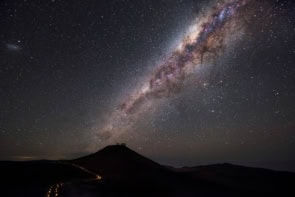Margaret Harris reviews Astrotopia: the Dangerous Religion of the Corporate Space Race by Mary-Jane Rubenstein

The list of items the Apollo astronauts left on the Moon is long, surreal and disturbing. In addition to the plaque announcing that Neil Armstrong and Buzz Aldrin “came in peace for all mankind”, it includes six American flags, two golf balls, a Bible and a nauseating 96 bags of faeces, urine and vomit. All told, the one-dozen men who walked on the Moon in the late 1960s and early 1970s left behind an estimated 200,000 kg of rubbish. Throw in a handful of Soviet craft, the Chinese rover Yutu-2, and the (probably) dead tardigrades from a failed 2019 Israeli mission, and the situation becomes clear: the Moon is a mess, and landing more people on it is only going to make it worse.
If you find this state of affairs depressing – if your fascination with the Moon, Mars and other wonders of our solar system is increasingly tempered by concerns that a small but powerful group of people seems hell-bent on mucking them up – then you should run, not walk, to your nearest bookseller for a copy of Astrotopia: the Dangerous Religion of the Corporate Space Race. Written by Mary-Jane Rubenstein, it offers a concise but stinging critique of the current “New Space” era, giving succour to space fans everywhere who are, in Rubenstein’s words, “sick over the decimation of this planet and horrified that this planet isn’t enough for the decimators”.
There is, Rubenstein argues, a direct line connecting NASA’s cavalier attitude towards dirty space nappies to Jeff Bezos’ dream of reducing the Moon to a fuel station – never mind Elon Musk’s quarter-baked scheme to “nuke Mars”
Rubenstein is a professor of religion and science in society at Wesleyan University in the US, and she draws on this background to link “New Space” with previous periods of exploration. There is, she argues, a direct line connecting NASA’s cavalier attitude towards dirty space nappies to Jeff Bezos’ dream of reducing the Moon to a fuel station – never mind Elon Musk’s quarter-baked scheme to “nuke Mars”.
The connection that most interests Rubenstein, though, is older. “There’s not much that’s new about New Space,” she writes in Astrotopia’s introduction. “Rather, the escalating effort to colonize the cosmos is a renewal of the religious, political, economic and scientific maelstrom that globalized Earth beginning in the 15th century.” Over the next two chapters, Rubenstein delves into the mindset of this earlier age, placing special emphasis on how European settlers/invaders used the Judeo-Christian concept of “God’s chosen people” to justify their destruction of Indigenous civilizations and ecosystems.
The brutal theology of Spanish conquistadores may, at first, seem irrelevant to today’s cosmic land-grab. The motives of today’s scientists and space entrepreneurs are, after all, largely not religious; many are aggressively secular. Subsequent chapters, however, make the connection clear. In one of them, Rubenstein tells the story of the man from California who laid claim to the Moon. His name is Dennis Hope, and if you like, you can buy chunks of lunar real estate from him for $25. This arrangement may sound ridiculous – Hope has no more claim to the Moon than you and I – but as Rubenstein observes: “It is no less absurd – and far less destructive – than a pope’s having ‘given’ the so-called New World to Spain.” Space enthusiasts who speak blithely about “conquering the final frontier” should bear in mind how horrific Earth’s frontiers were for the people who got conquered, and consider what their descendants might think of such rhetoric.
There are, of course, no humans on the Moon, Mars or asteroids. There will be no repeat of the genocide of Indigenous peoples in space. But what about other organisms we might find? We barely understand what intelligence looks like in other mammals, let alone how it might manifest in aliens. As Rubenstein writes: “How would we ever know we weren’t interfering with the native biotic processes of Mars?”
Other cautionary examples (though not ones that appear in Astrotopia) concern the Polynesians who populated the Pacific archipelago and the Norse who settled Iceland. By colonial standards, their explorations were benign. Even so, their arrival utterly transformed these previously uninhabited lands. Grazing Norse sheep laid waste to Iceland’s thin, volcanic soils. Polynesian dogs, chickens and pigs decimated Pacific atolls. It was partly for these reasons that American astronomer Carl Sagan – nobody’s idea of a party-pooper when it comes to space exploration – once wrote: “If there is life on Mars, I believe we should do nothing with Mars. Mars then belongs to the Martians, even if the Martians are only microbes.”
Rubenstein, characteristically, takes things a step further. If Mars lacks even microbes, she wonders, might it still “belong” to its own bare and lifeless rocks? As an example of why it might, she cites Australia’s Uluru, the iconic reddish sandstone rock formation in the Northern Territory. While Uluru was an inert resource to the European settlers who called it Ayers’ Rock, it is an object of profound, living value to the Yankunytjatjara and Pitjantjatjara peoples who have lived in its shadow for millennia. Rubenstein also notes (quoting the philosopher Holmes Rolston III) that Mars’ Valles Marineris is “four times as deep as the Grand Canyon and as long as the United States is wide”. Given this grandeur, she writes, “we probably shouldn’t turn it into a parking lot, a garbage pit or the galaxy’s biggest swimming pool”.
The space industry’s image problem (and what to do about it)
There are, of course, plenty of other reasons to dislike how “final frontier” explorations are shaping up, and Astrotopia is pithy about most of them. One example is the circularity of arguments in favour of space colonization (“We need to have a long-term presence in space in order to retrieve and use the resources that will establish a long-term presence in space”). Another is the likely living conditions of ordinary colonists (“Do we really expect that the notoriously inhumane industries of mining, manufacturing and global retail will suddenly establish decent working conditions on literally uninhabitable planets?”).
Finally, there is the problem of space junk. Here, oddly, Rubenstein finds grounds for optimism. While she notes that “the clearest indication of the limits of ‘infinite space’ is the growing pile of garbage around us”, she also speculates that this “shared disaster” might “finally make it clear to the corporate cheerleaders and cosmic nationalists that space is a commons after all… Could the space junk threatening to strangle us actually be our salvation?”.
It’s an intriguing idea, and there are plenty more where it came from. When I review a book, I like to mark important passages and pithy phrases with sticky notes. By the time I finished Astrotopia, my copy had more paper flags than a Jubilee street party. I hope this review illustrates why this was so, and why Rubenstein’s arguments deserve the widest possible hearing among people who dream of exploring space without exploiting it.
- 2022 University of Chicago Press $45.00hb 224pp




